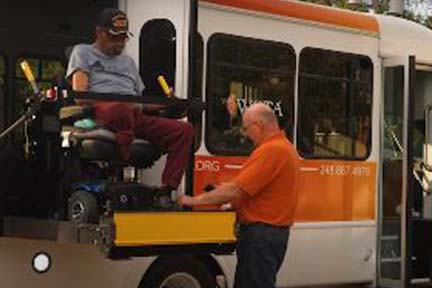
$5.5 Million Investment for Upper Peninsula Projects

FOR PLANNING PURPOSES October 17, 2024 Contact: [email protected]
Gov. Whitmer Announces $5.5 Million Investment for Upper Peninsula Projects, Protecting 85 Jobs and Supporting Community Revitalization Efforts LANSING, Mich. – Today, Governor Gretchen Whitmer and the Michigan Economic Development Corporation (MEDC) announced business investment and community revitalization projects in Michigan’s Upper Peninsula that will represent over $5.5 million of capital investment and protect 85 high-paying jobs in the region.
“Today’s projects will drive more than $5.5 million of investment and protect 85 good-paying jobs in Houghton and Schoolcraft counties,” said Governor Whitmer. “From an upgrade to lower operating costs and emissions at a lumber plant to more housing in downtown Manistique, we are moving forward with our comprehensive economic development strategy to win projects, invest in places, and support people. Let’s keep working to add more tools to our economic development toolkit so we can help more companies expand and support developers as they build more affordable housing. Together, we will keep proving that Michigan is the best place to live, work, and invest.”
“Today’s announcement furthers Team Michigan’s commitment to people, projects and places by supporting business development, ensuring job retention and focusing on community revitalization efforts in the U.P.,” said MEDC Senior Vice President of Regional Development Matt McCauley. “We applaud the commitments from Northern Hardwoods and Cedar Street Real Estate in their efforts to Making it in Michigan.”
Northern Hardwoods Lumber has announced plans to invest in and install a new biomass boiler and a back-pressure steam turbine at their facility in Atlantic Mine, Houghton County. The investment in upgrades to the facility will provide the opportunity to reduce operating costs and greenhouse gas emissions leading to a more energy efficient process. Investments will also add longevity to the company’s operations and the retention of 85 jobs in the city. Without this investment, the company would have to close its doors at the end of the current boiler’s lifecycle.
The company is anticipating $4,750,000 in capital investment with the support of a $250,000 Michigan Business Development Program grant from the Michigan Strategic Fund. The 85 jobs that will be protected as a result of this investment will have averages wages of $23.76 per hour plus benefits, $4.50 per hour above the regional Median wage. In addition to MSF support, the company has also been awarded a $1,000,000 Wood Innovations Grant from the United States Department of Agriculture (USDA).
The Northern Hardwoods investment further amplifies how Michigan has positioned itself to compete for and win projects that create and protect good-paying jobs, while positioning the state as a leader in climate action through both the MI Healthy Climate Plan and federal macro-industrial policies like the CHIPS Act, Inflation Reduction Act, and Infrastructure Investment and Jobs Act.
“Northern Hardwoods continues its long history of providing good paying jobs through the processing of some of Michigan’s highest value timber from the hardwood forests of the Upper Peninsula,” said Jeff Ratcliffe, Executive Director of the Keweenaw Economic Development Alliance. “We are proud to support their continued investment in our community and appreciate the MEDC’s financial support for Northern Hardwoods’ efforts to improve capacity and efficiency and remain a great employer in the Keweenaw.”
The company’s parent, JM Longyear, is a privately held company in Michigan’s Upper Peninsula that acquired Northern Hardwoods Lumber, LLC in 2015. Northern Hardwoods is a hardwood sawmill originally built in 1969 that currently produces 20 million board feet per year.
“Northern Hardwoods is deeply grateful for the support of the Michigan Economic Development Corporation,” said Cody Meier, Director of Financial Planning & Analysis at JM Longyear. “The project to install a new biomass boiler and steam turbine will enable us to continue operations, retain our talented workforce, and further utilize the renewable resources that the Upper Peninsula of Michigan offers.”
For those interested in exploring a career with Northern Hardwoods, please click here.
Cedar Street Real Estate has announced revitalization efforts of a former bank in the heart of downtown Manistique through the activation of the second floor of the building. The architectural features of this building along with the prior façade restoration efforts make this building one of the crown jewels of Schoolcraft County. The building will be transformed from a vacant commercial building to a mixed-use commercial and future residential property with support from the Michigan Strategic Fund through a Build MI Community Grant Initiative in the amount of $250,000.
In total, the project will redevelop 4,670 sq. ft. of former office space into three residential apartments on the second floor, representing nearly $820,000 of capital investment. Activating this space will help increase the density of downtown Manistique while providing much-needed residential units in the community.
“We were looking to invest in downtown Manistique in a way that provides much-needed housing along the commercial corridor,” said Kristina Behrens and Antonio Adan, Cedar Street Real Estate Developers. “My family has been in the area since the 1960s and we feel a connection to the community. This building had been on the market a couple years ago, and when we visited, we were immediately drawn to the potential of the floor plan and the beautiful features of the building. The mixed-use development will enable patrons to enjoy a more pedestrian-friendly downtown area.”
The site is a priority for the City of Manistique and has received local support in the form of an OPRA tax abatement with an estimated value of $81,577. The regional economic development organization, Invest UP, has prioritized the project for the region by providing collateral support from the Build UP program.
“I’m thrilled for Kristina and her receipt of the MEDC Build MI Community Program grant,” noted Victoria George, Executive Director of Schoolcraft Tourism & Commerce. “Her project to renovate the Manistique Bank building is a wonderful example of how small developers can make a significant impact on our community. By adding three new apartments to the area, Kristina is directly addressing our housing shortage and providing much-needed housing options for our residents. We are also grateful for programs like MEDC’s and Invest UP’s Build UP program, which provide invaluable support to those pursuing projects in our community.” |





 Secretary Benson spoke in Detroit ahead of the 2024 General Election to announce a new tool that will make election data more accessible to the public.
Secretary Benson spoke in Detroit ahead of the 2024 General Election to announce a new tool that will make election data more accessible to the public. Secretary Benson spoke at a news conference in Detroit to announce the Michigan Voting Dashboard, an interactive tool that will display daily election data.
Secretary Benson spoke at a news conference in Detroit to announce the Michigan Voting Dashboard, an interactive tool that will display daily election data. Secretary Benson smiled for a photo alongside students from UMSI, Scott Tenbrink, an instructor at UMSI; Canton Township Clerk Michael Siegrist, and Whitney Quesenbery, director of the Center for Civic Design (right).
Secretary Benson smiled for a photo alongside students from UMSI, Scott Tenbrink, an instructor at UMSI; Canton Township Clerk Michael Siegrist, and Whitney Quesenbery, director of the Center for Civic Design (right). Secretary Benson stood alongside (pictured from left to right) Siegrist, UMSI student Jackson Gelbard, Tenbrink, Quesenbery, and Secretary Benson.
Secretary Benson stood alongside (pictured from left to right) Siegrist, UMSI student Jackson Gelbard, Tenbrink, Quesenbery, and Secretary Benson.


